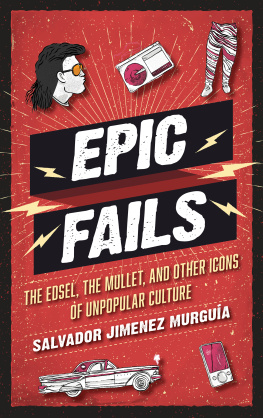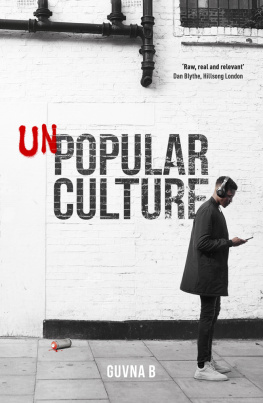Epic Fails
Epic Fails
The Edsel, the Mullet, and Other Icons of Unpopular Culture
Salvador Jimenez Murgua
Rowman & Littlefield
Lanham Boulder New York London
Published by Rowman & Littlefield
An imprint of The Rowman & Littlefield Publishing Group, Inc.
4501 Forbes Boulevard, Suite 200, Lanham, Maryland 20706
www.rowman.com
Unit A, Whitacre Mews, 26-34 Stannary Street, London SE11 4AB
Copyright 2018 by The Rowman & Littlefield Publishing Group, Inc.
All rights reserved . No part of this book may be reproduced in any form or by any electronic or mechanical means, including information storage and retrieval systems, without written permission from the publisher, except by a reviewer who may quote passages in a review.
British Library Cataloguing in Publication Information Available
Library of Congress Cataloging-in-Publication Data Available
LCCN 201800437 (print) | ISBN 9781538103722 (electronic) | ISBN 9781538103715 (hardback : alk. paper)
 The paper used in this publication meets the minimum requirements of American National Standard for Information SciencesPermanence of Paper for Printed Library Materials, ANSI/NISO Z39.48-1992.
The paper used in this publication meets the minimum requirements of American National Standard for Information SciencesPermanence of Paper for Printed Library Materials, ANSI/NISO Z39.48-1992.
Printed in the United States of America
To my mother, Olivia,
who taught me in so many ways that wrapped in every failure
is an endearing lesson about ones potential for success.
Acknowledgments
This book is actually the result of a number of failed attempts at publication. Because of this, I would like to thank all of the previous publishers that contracted the book and then ultimately canceled the agreement. Without their help, I would not have received the much-needed scrutiny that brought this book to the condition it is today. Moreover, by failing to see this book into publication so many times, I was able to locate an ideal fit for it at Rowman & Littlefield. With the help and interest of Stephen Ryan, senior acquisitions editor at Rowman & Littlefield, this book has finally achieved success in publicationfor this, I am incredibly grateful to Mr. Ryan. I would also like to thank Dr. Cynthia Miller of Emerson College, Dr. Bob Batchelor of Miami University, and Dr. Norma Jones of Muller Entertainment, all of whom were instrumental in directing me to Rowman & Littlefield.
I received funding for travel and fieldwork from Akita International University, and I am equally grateful for its continued support of my research. In particular, university vice president Peter McCagg and librarian Yukari McCagg were invaluable in offering advice and guidance.
Finally, I would like to express my deepest gratitude to my familyHide, Koki, Kiki, and Polifor laughing aloud when I read my manuscript to them. Nothing inspired me more than watching my wife and kids demonstrate that much interest and enthusiasm for my work!
Introduction
In early July 2009, Chicago Public Medias popular radio program This American Life featured a story of an individual who claimed insanity in an attempt to avoid a lengthy prison sentence. Explored through the colorful reporting of Welsh comedian/journalist Jon Ronson, the story begins with a reference to an edition of the Diagnostic and Statistical Manual of Mental Disorders (DSM-IV-TR), a standard manual of diagnosis used by mental health professionals. His playful articulation running at full speed, Ronson reflects upon his own self-diagnosis:
While flipping through it, I instantly diagnosed myself with twelve different disorders, including but not limited to Disorder of Written Expression, which is poor handwriting; Arithmetic Learning Disorder, which has luckily been cured since I bought a calculator; and Nightmare Disorder, which is diagnosed when the sufferer dreams of being pursued or declared a failure. All my nightmares involve someone chasing me down the street while yelling: Youre a failure! I closed the manual. I never realized how unbelievably nuts I was.
The sleep disorder Ronson refers to is indeed found within the DSM-IV-TR under Nightmare Disorder. In actuality, however, this disorder as explained in the DSM-IV-TR mentions failure only peripherally. Aside from this and other subtle references throughout the social sciences, failure is not somehow bound to any one human shortcoming, which certainly does not suggest that failure is in an exclusive category of its own. Instead, failure, as it will be used in this book, may be thought of in more relative and practical terms: failure is simply a lack of success.
Americas many successful inventions over the yearsfrom the lightbulb and the Brooklyn Bridge to Hollywood and the internethave often been the result of a stunning combination of innovation and ambition. Such successes have been honored as things that have changed American lives for the better, yet just as there are national nightmares that offset the notion of an American Dream, there are also cultural by-products and failures lining the road to Americas iconic reputation as a primary contributor to modern civilization. Thousands of memes parodying failures flood the internet daily, demonstrating that Americans love to laugh where ambition has overreached and ingenuity has fallen short. Nevertheless, just because something is a failure doesnt necessarily mean that it doesnt matter.
This book surveys some of the most iconic failures in American popular culture in order to shed light on the inherent, often comic strain in American life between success and failure, fame and infamy: in sum, between what Americans most strive for and what they most fear. Epic fails, as I describe them, are not only the next big things but also those more popularly unpopular things that get bundled in with major flashes in the pan. From such failed gadgetry as the Betamax and Microsoft Zune to fashion flops like the mullet and Zubaz, this book captures the entertaining milieu of failure while offering interpretations of both the intentions of these endeavors prior to their collapse as well as speculations about their counterfactual position and place in the history of American popular culture.
The aim of this book is geared more toward interpretation than explanation. Although a definitive treatise on failure, its causes, and even ideas about how to prevent it would certainly be a useful contribution to research on this subject, in reality endeavors such as these simply do not figure into the multiplicity of interpretations that I have used to guide this text. Many of the chapters contained herein are steered by well-established research from the social sciences and humanities, effectively offering readers both a case study in unpopular culture and an accessible theoretical model to assist them in arriving at their own conclusions.
Notwithstanding my reluctance to offer positivist explanations, I do make some early categorical generalizations about how these cases ended up as failures. Indeed, at least three broad categories of failure are at the thrust of this book: (1) failure due to negative consumer reception, (2) failure of an endeavor that was doomed from its inception by a lack of vision, and (3) failure occasioned by either poor timing or simply the progression of time that rendered a product or production pass.
To begin, many endeavors fail because of poor reception by the general public. As many of the products and productions of popular culture found in these pages were intended to be mechanisms for generating profit, it follows that customers or audiences vote for the popularity of these endeavors through their choices about how to spend their money. Success or popularity in these cases is thus tied to the positive reception of, or satisfaction with, commercial products.
One illustration of this category involves the reception of a marketing campaign by special interest groups. In March 1989 Madonna released her fourth album, titled Like a Prayer. With her popularity peaking among young audiences, the soft drink purveyor PepsiCo brokered a deal to use the first single of Madonnas new album as the sound track for one of its commercials. According to Phil Dusenberry, former chairman of BBDO, the advertising agency overseeing the marketing campaign, the Pepsi-Madonna agreement almost immediately fell apart because of an assumption about connections audiences would draw between the content of Madonnas performance in the commercial and the content of her performance in the songs music video. Although the commercial performance and the music video were substantially different, they were both running at the same time, and Pepsi was concerned that audiences might make connections between the advertisement and the provocative imagery from the videoa potentially controversial interplay: It was the Catholic and Protestant communities that really howled. The Like a Prayer video was an incendiary, prurient mishmash of Christian church imagery that many people of faith regarded as obscene and sacrilegious. And because the video song was also the Pepsi song, all hell broke loose.
Next page










 The paper used in this publication meets the minimum requirements of American National Standard for Information SciencesPermanence of Paper for Printed Library Materials, ANSI/NISO Z39.48-1992.
The paper used in this publication meets the minimum requirements of American National Standard for Information SciencesPermanence of Paper for Printed Library Materials, ANSI/NISO Z39.48-1992.